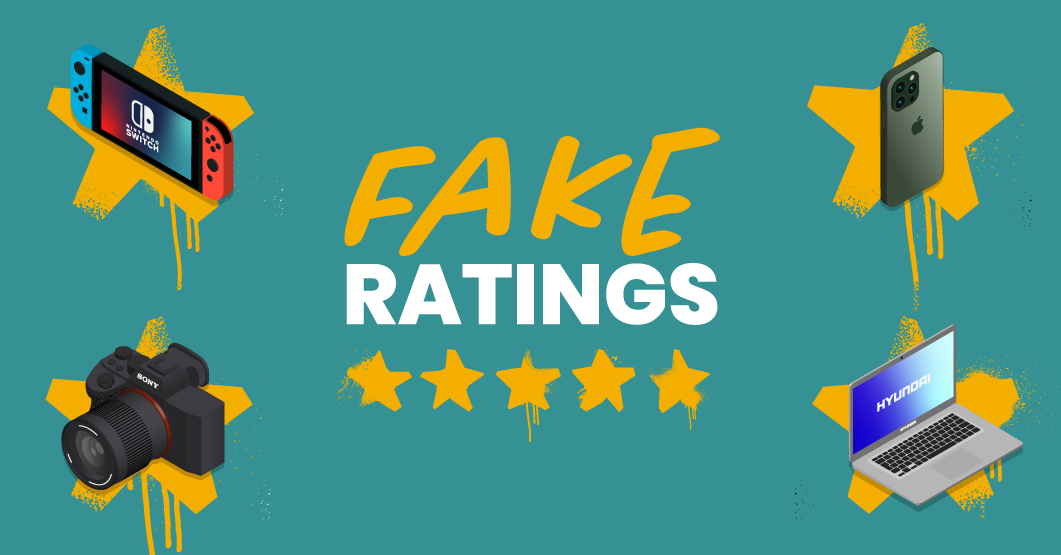
You never quite know – truly, deeply know – a desirable new electronic product until it’s in your hands.
The best you can do is to read what others have made of it. Indeed, nine out of ten of us read product reviews before we buy. And by 2023, nearly one in three appliances are likely to be bought online – making us more reliant than ever on web reviews to gain insight into the objects of our desire.
But reviews are not all born equal. In fact, studies have shown that consumer reviews tend to present very different conclusions to those of “objective,” journalistic product testers.
So should you trust consumer reviews? With a big pinch of salt. According to an influential study for the American Marketing Association, led by MIT Sloan professor Duncan Simester:
- Only 1.5% of buyers write reviews.
- This 1.5% is quite unlike the average consumer (they buy more, return more, and shop the sales more; they’re younger, less wealthy, and have more children than average).
- Around 5% of reviews are from people who don’t appear to have bought the product.
- This 5% of reviewers are more likely to be negative than verified buyers.
There are a lot of variables when choosing which reviews to trust. And this doesn’t even account for out-and-out fake reviews. As it turns out, the integrity of consumer reviews varies significantly between product types and brands. To guide consumers through the maze, Electronics Hub decided to figure out which electronics makes and models get the most fake consumer reviews.
Outline
Toggle- What We Did
- Smartphones and Cameras Get the Most Fake Reviews
- Sony Alpha with “Insane” Resolution Leads Most-Faked Amazon Camera Reviews
- Gaming Console Reviews Are Relatively Reliable
- Hyundai Laptop’s Mediocre Reviews Bookended by Fakes
- iPhones and Xiaomi Reviews the Least Trustworthy Among Phones
- Xiaomi and Hyundai Are the Brands with Most Fake Reviews
- Canon is the Camera Brand with the Least Reliable Amazon Reviews
- Two Out of Five Hyundai Laptop Reviews Are Fake
- Apple and Samsung Rival Huawei as Most-Faked Phone Brand
- Trust the Experts
- METHODOLOGY & SOURCES
What We Did
The Fakespot website uses artificial intelligence to “detect fake reviews and scams.” We analyzed Fakespot data to identify the electronic products and brands with the highest density of Amazon reviews suspected of being fake or unreliable. Please note that these findings are not a reflection on the brands themselves, and fake reviews may be provided by scammers, third-party merchants, rivals, and fans, among other reviewers.
Key Findings
- The Apple iPhone 13 Pro Max is the electronic product with the highest density of fake reviews (70.0%).
- The brand with the highest overall density of unreliable reviews is Xiaomi (47.67).
- Around 36.3% of Nintendo Switch reviews are fake, the highest figure for any gaming console.
- The Sony Alpha 7R IV (45.5%) and Canon EOS R6 (45.0%) are the cameras with the most unreliable user reviews.
Smartphones and Cameras Get the Most Fake Reviews
First, we looked at the specific electronic product models with the most unreliable Amazon reviews. The overall top ten is dominated by smartphones, with camera reviews also flagged frequently – in general, console and laptop reviews are less likely to be fake.
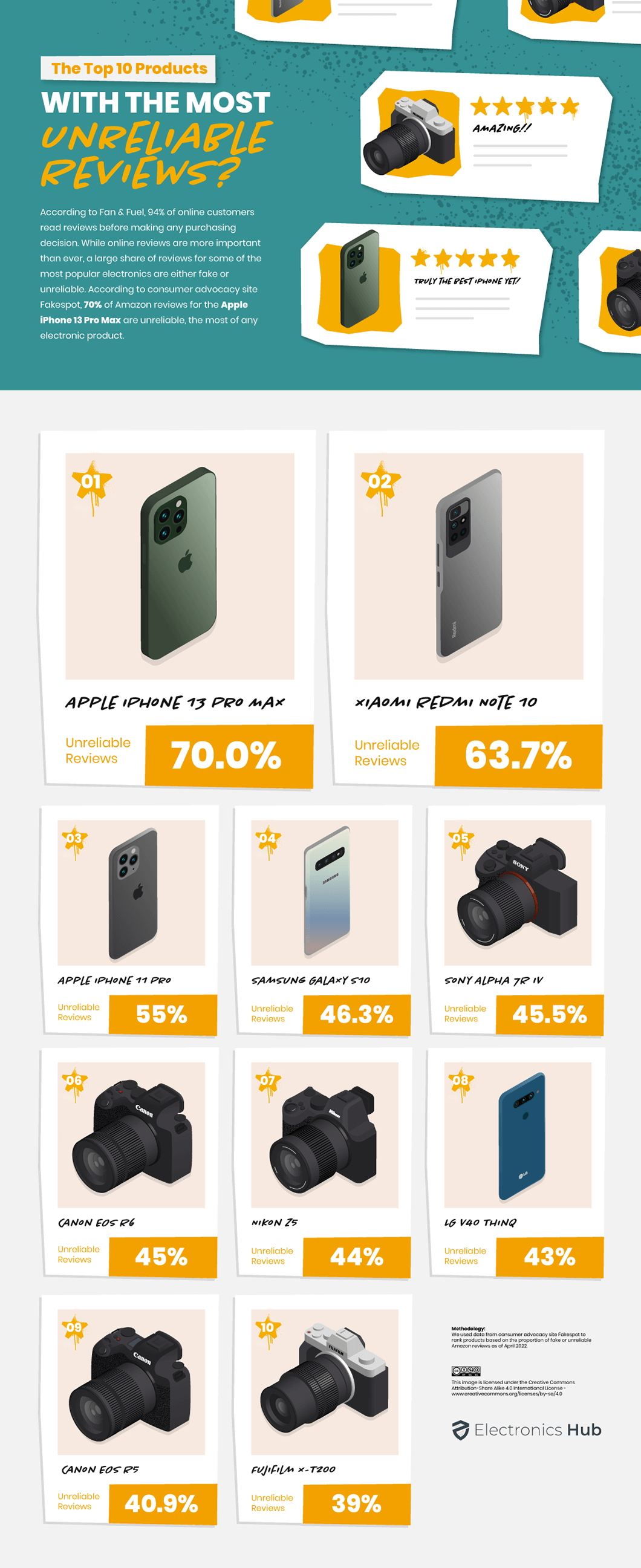
There are fake iPhones, and there are fake iPhone reviews. We’re here to talk about the latter. Because if you read a review of the 13 Pro Max or the 11 Pro, more likely or not, it’s unreliable. In unrelated news, Apple removed the Fakespot app from the iOS App Store on Amazon’s behalf in 2021, with Fakespot founder Saoud Khalifah saying, “I’m shocked Apple decided to side with Amazon without any proof… Amazon is willing to bully little companies like ours that showcase the cracks in their company.”
Sony Alpha with “Insane” Resolution Leads Most-Faked Amazon Camera Reviews
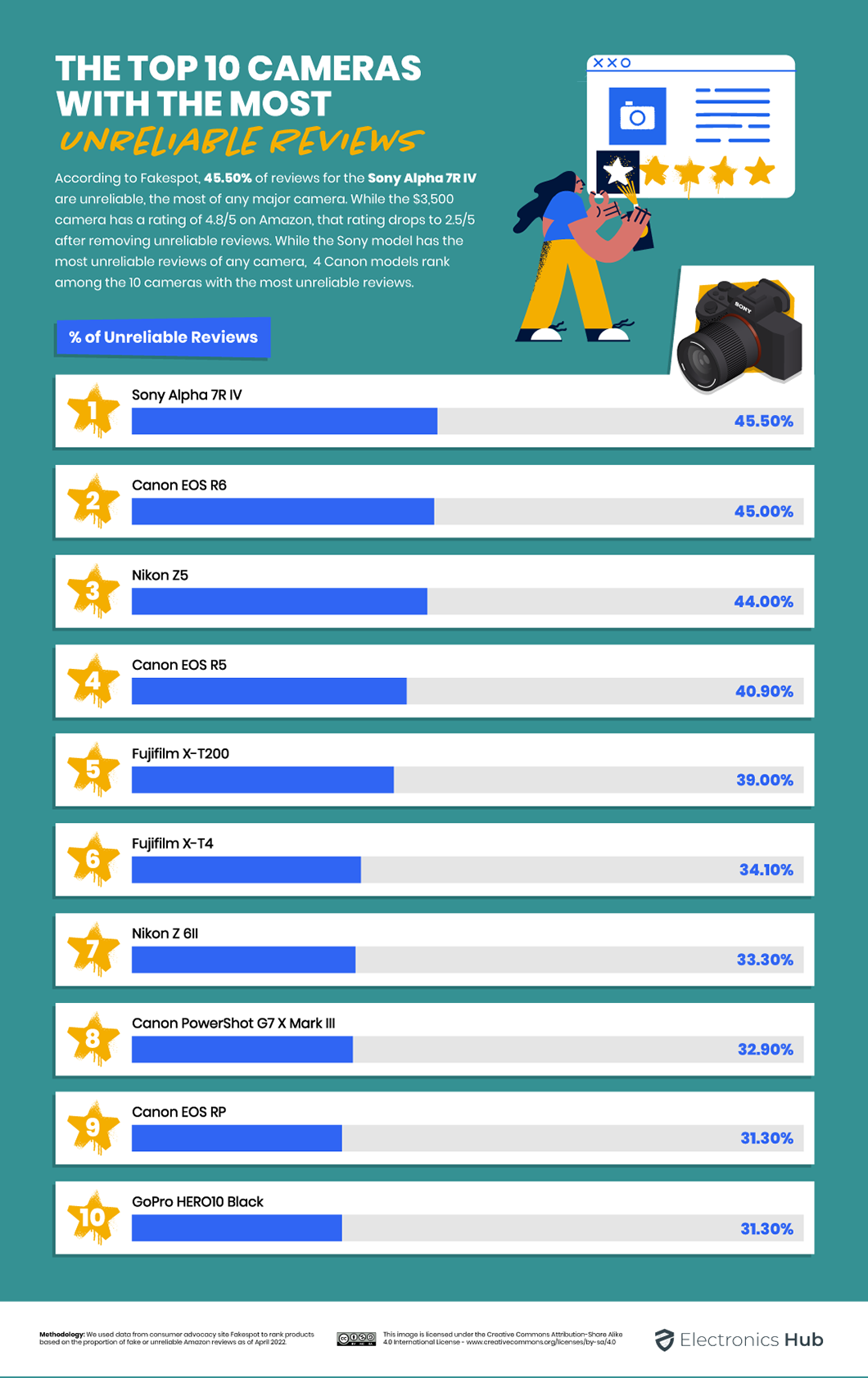
Sony’s Alpha 7R IV set new standards with its 61-megapixel resolution, and it’s the kind of kit that fans talk about in religious terms. But since up to half the Amazon reviews may be fake, you’ll need to splash $3k to find out for yourself. As some reviewers point out, the negative reviews that do appear may be the result of buyers who are disappointed that a godlike camera won’t make them a godlike photographer.
Gaming Console Reviews Are Relatively Reliable
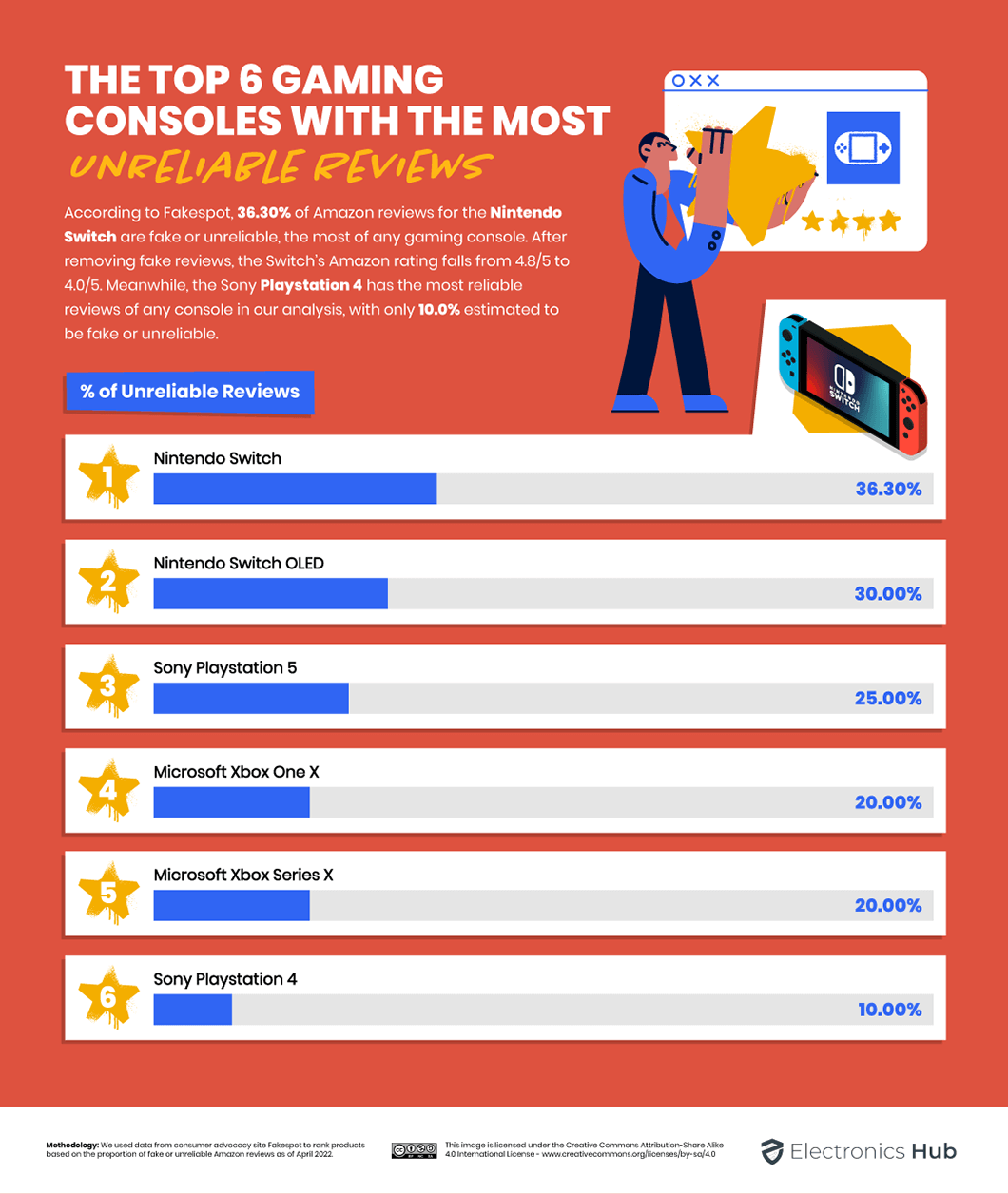
Gaming reviews appear to be an arena of integrity, with only six consoles achieving enough Amazon write-ups to figure in our research (our minimum for meaningful data is 100). Three of these have fewer than one in five flagged reviews. Nintendo Switch reviewers are the biggest offenders; Amazon has been plagued with fake third-party listings for the Switch, while on another occasion, Amazon accidentally sent out a bunch of random items (including a David Walliams book, washing powder, a microphone and a tambourine, Lego, bedsheets, and bottle of ‘photopolymer resin’) in place of the Nintendo consoles customers had ordered. So you’re forgiven if you find the Switch reviews section a little confusing.
Hyundai Laptop’s Mediocre Reviews Bookended by Fakes
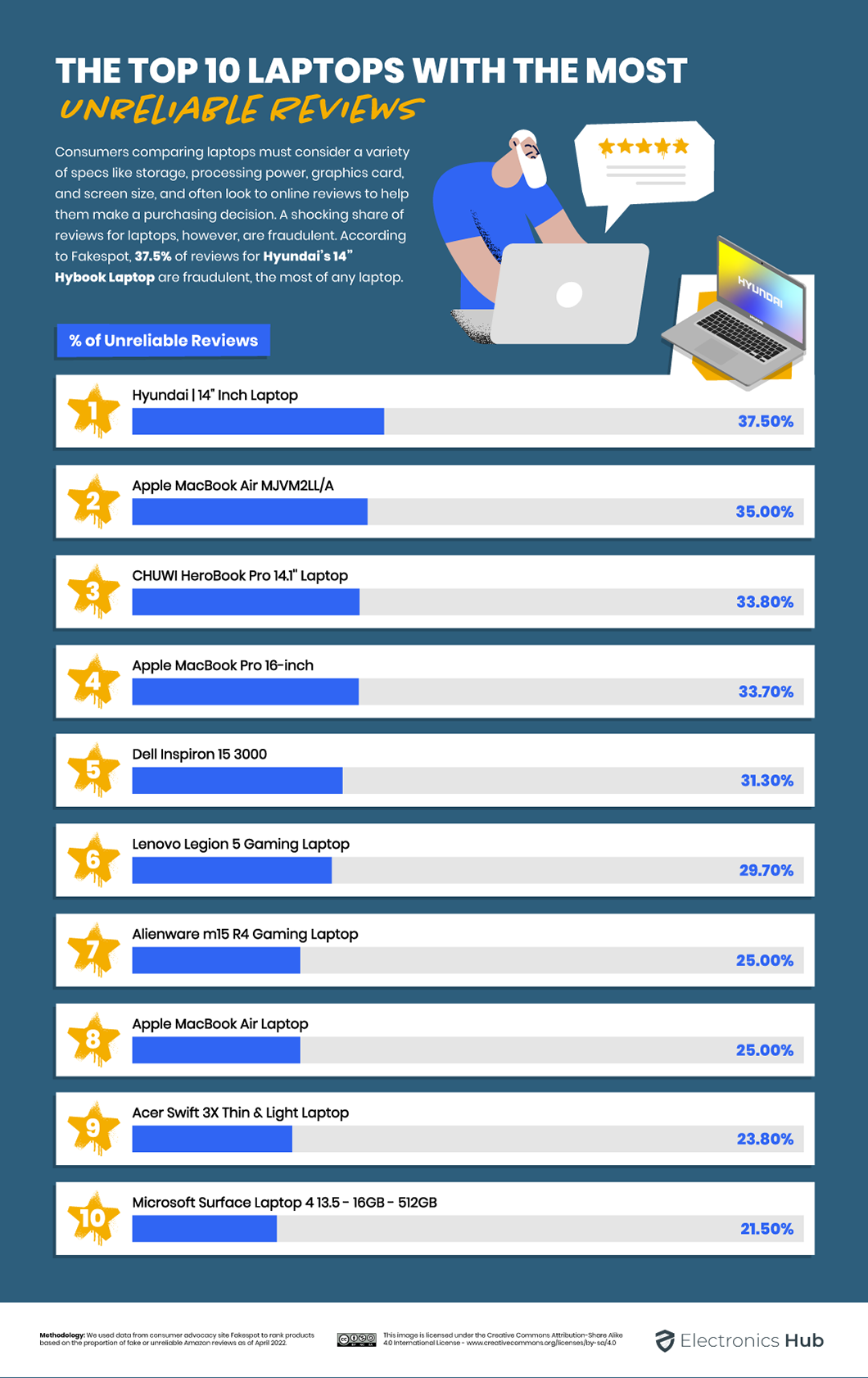
It’s not easy buying a laptop. When the specs start to get interesting, prices quickly soar – and you still have a ton of variables to ponder. The Hyundai 14″ Inch Laptop is very much at the low end of the price range, making the 5-star reviews seem improbable and 1-star reviews uncharitable. Indeed, it is the laptop with the highest density of fake reviews. Thankfully, there are plenty of realistic write-ups with headlines like “Not that bad, actually” and “Mixed feelings” to consider between the more polarized responses.
iPhones and Xiaomi Reviews the Least Trustworthy Among Phones
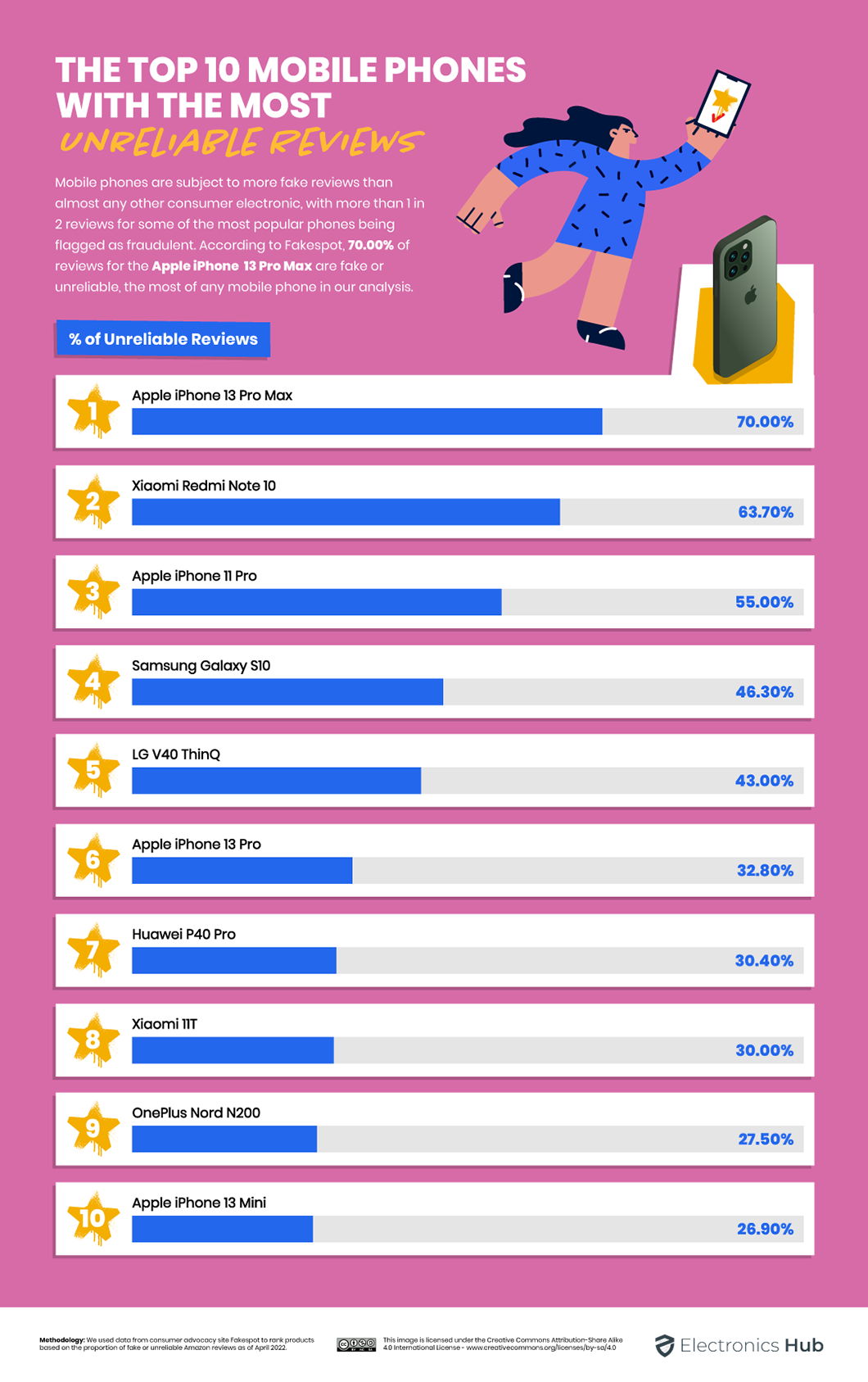
As discussed above, iPhones have the most unreliable reviews among electronic products. But Xiaomi Redmi Note 10 joins them in having more fakes than real ones. This mid-level phone is not supposed to be remarkable. Still, neither are buyers’ expectations very high, so extreme reactions are immediately suspect – particularly in light of Xiaomi’s brand war with Huawei. The former is attempting to scoop up disgruntled users of the latter since Huawei was banned from using Google’s Android operating system.
Xiaomi and Hyundai Are the Brands with Most Fake Reviews
Next, we looked at which brands tend to boast the most unreliable reviews on Amazon. While several of these firms produce multiple device types, the top ten reveal a clear presence of brands with an interest in smartphones.
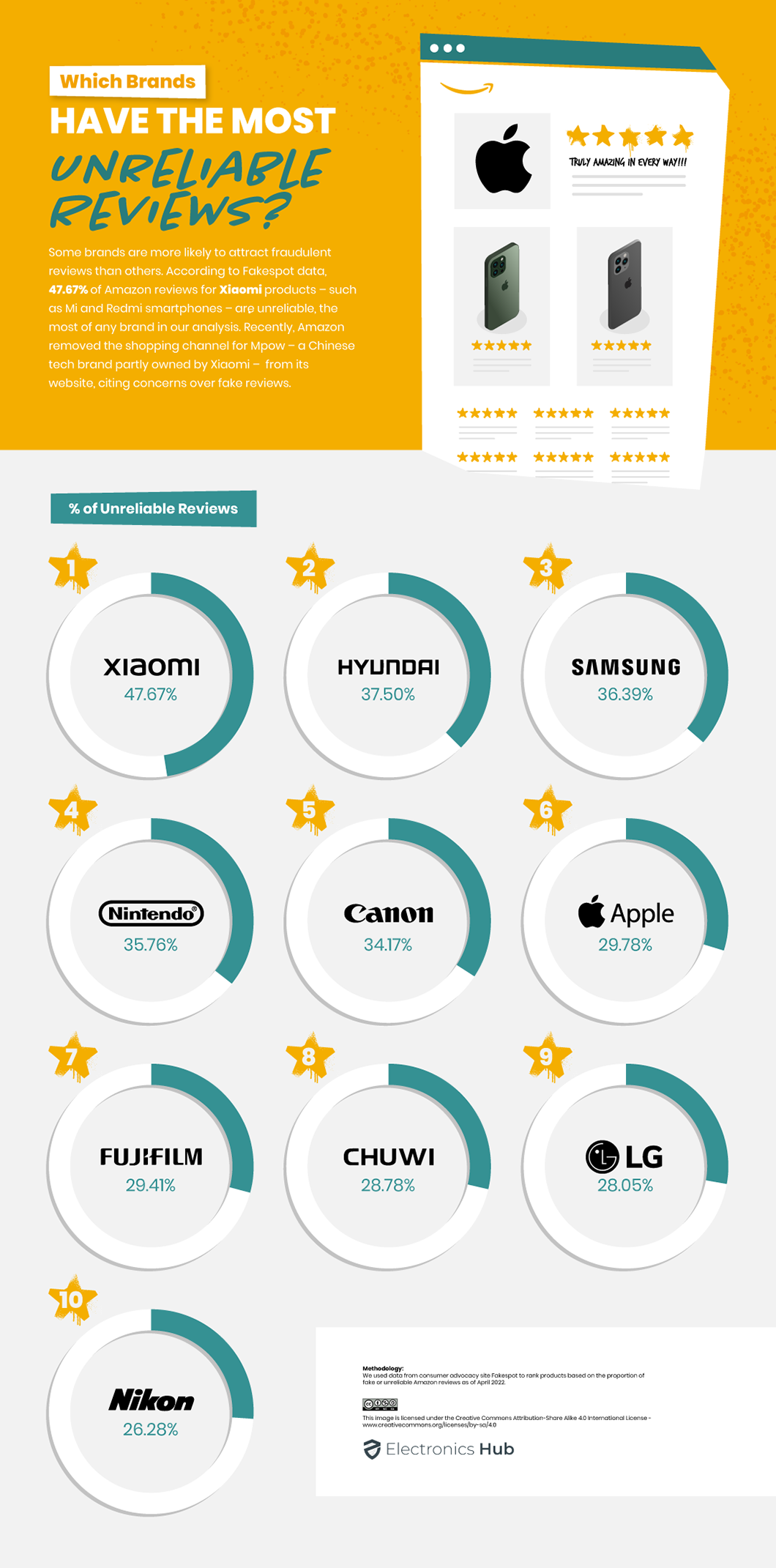
With the fortunes of Chinese brand Xiaomi rising, it remains a contentious young presence on the smartphone market. In addition to vacuuming up Huawei’s Android-loyalist users, Xiaomi has succeeded its rival as the smartphone partner of the classic Leica camera brand. As western consumers struggle to make sense of this change in the affordable Chinese hardware market, they are vulnerable to rumors and lies about the brand’s phones – whether these are puffed-up 5-star reviews or snide one-star smear campaigns.
Canon is the Camera Brand with the Least Reliable Amazon Reviews
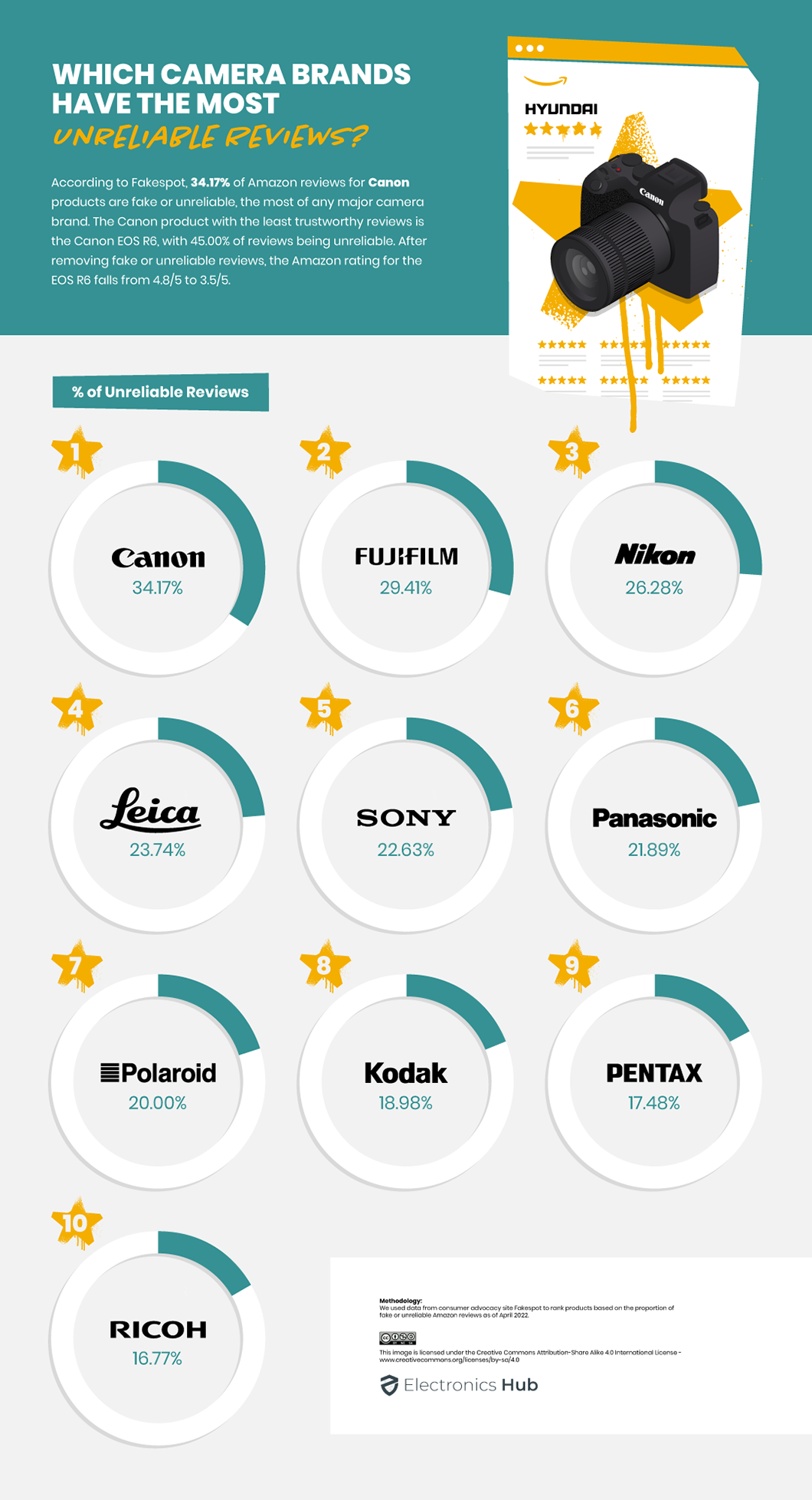
As much as any other big tech name, camera brands inspire fierce loyalty and inter-brand rivalry. The big names in this top ten are legendary enough to stir the emotions of photographers from across the generations. But it is wrong to assume that fake reviews written by an electronics brand’s loyal fans are always positive puff pieces. In fact, Duncan Simester’s research suggests that brand loyalists may consider themselves “self-appointed brand managers” who write negative reviews as “feedback” on items they haven’t purchased.
Two Out of Five Hyundai Laptop Reviews Are Fake
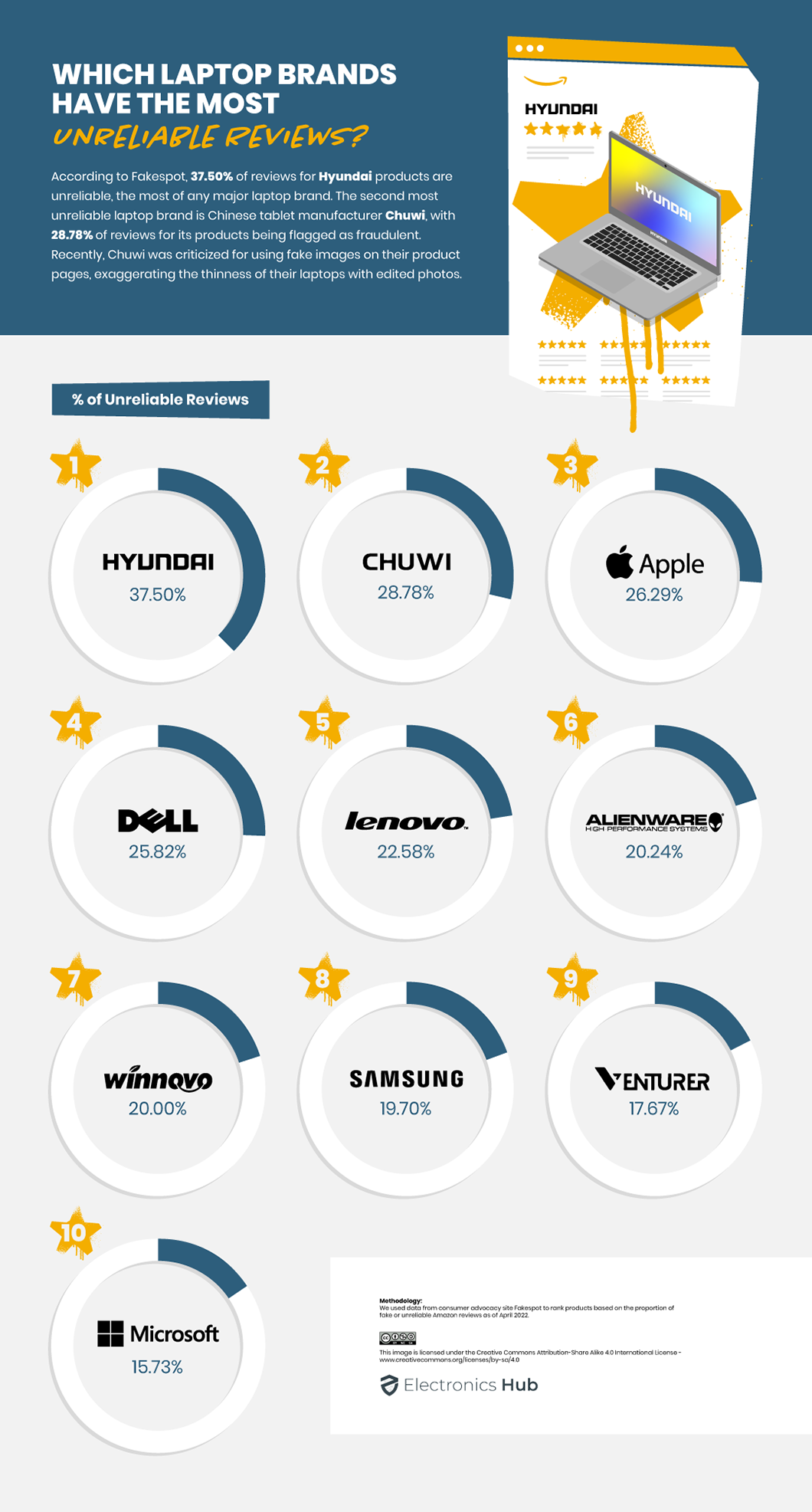
Some of the worst products for fake Amazon reviews are ‘unknown’ brands trying to get ahead in search results. But if you thought you’d find a reliable review section in the sensible arena of big brand-name laptops, you’d be mistaken. Nearly two in five Hyundai reviews are unreliable, and Fakespot flags more than a quarter of laptop reviews for Chuwi, Apple, and Dell.
Apple and Samsung Rival Huawei as Most-Faked Phone Brand
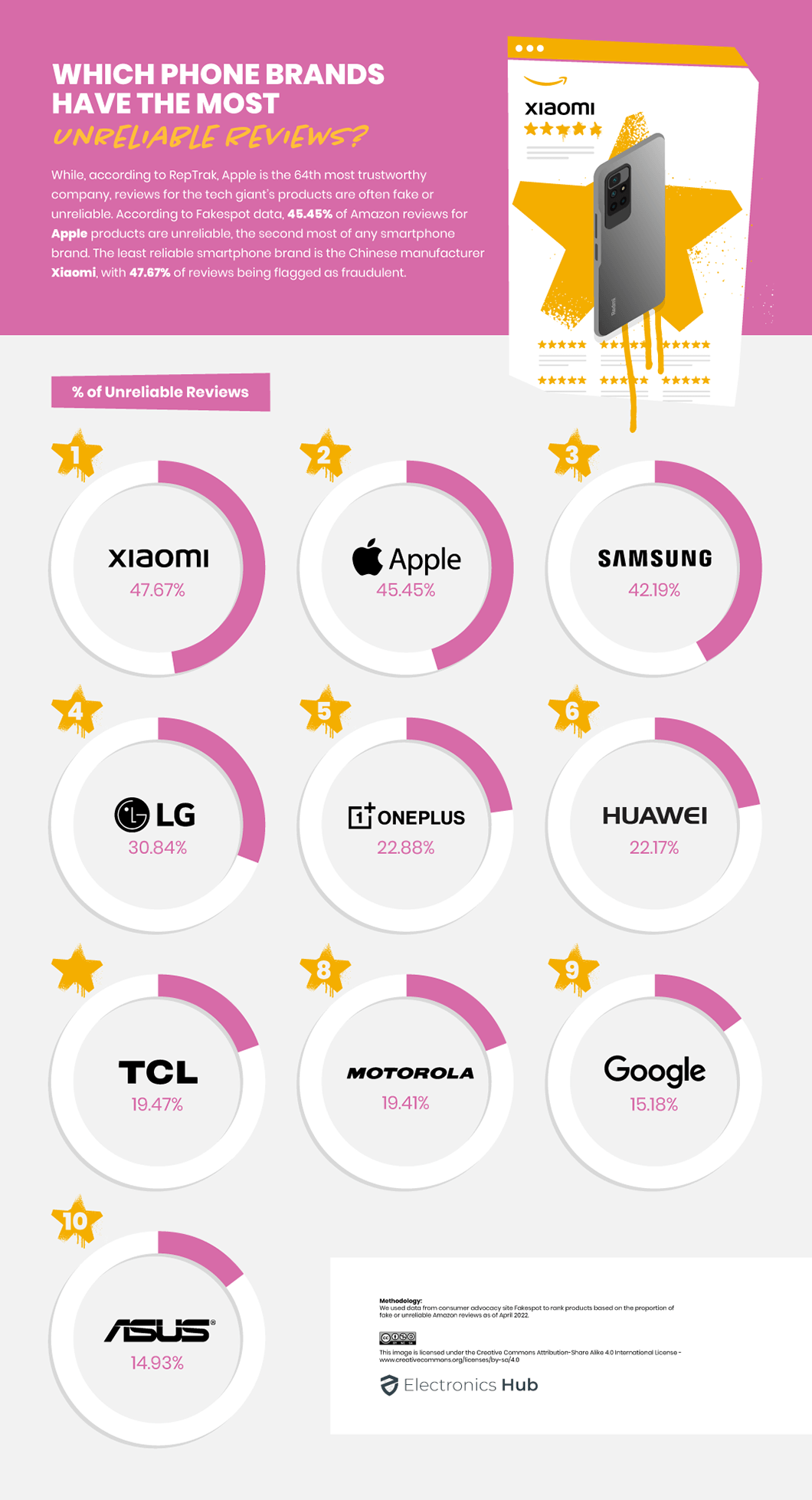
Phone brands have the biggest disparity between the most and the tenth-most fake reviews out of any brand category. Xiaomi has more than three times the fake reviews of Asus and more than twice that of their rival Huawei. Meanwhile, high-end rivals Apple and Samsung are neck and neck to be the phone brand with the second-highest density of fake reviews.
Trust the Experts
While the extreme reactions of a 1-star or 5-star reviewer may be valid (if they’re honest), they are probably of less objective use to the average consumer than, well, the average review. If you’re researching a product to buy, the smart choice is to combine professional reviews with multiple 3-star customer reviews – and to focus on the facts and context that they convey. You can also use our data below to identify how many reviews of your product of choice are likely to be fake.
Buying stuff is emotional. It makes us feel powerful and in control, and the products we purchase contribute to our sense of identity. To keep that sense of control, check the user reviews section carefully – and always refer to the experts.
METHODOLOGY & SOURCES
To determine the products with the highest number of fake ratings, we reviewed data from consumer advocacy website Fakespot, which flags reviews on Amazon suspected of being fake or unreliable. We ranked products based on the number of unreliable Amazon reviews as a percentage of total Amazon reviews. We only considered products with at least 100 total reviews. Brands and product categories were aggregated from the product level and ranked in the same way. The data was collected in April 2022.

